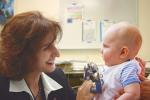Maria targets postnatal depression
An Adelaide researcher will use her NHMRC funding to trial an anti-depressive drug which could help women suffering postnatal depression. In turn, this could come with the possible bonus side-effect of boosting brain activity in their children. Dr Maria Makrides, from the Child Health Research Institute based at the Women's & Children's Hospital and Flinders Medical Centre, and a Senior Research Fellow in the University of Adelaide's Department of Paediatrics, received the largest NHMRC grant among Adelaide researchers with $1.6 million over four years. Her project title is A Randomised Trial of DHA (Docosahexaenoic acid) in Pregnancy to Prevent Postnatal Depressive Symptoms and Enhance Neurodevelopment in Children. "Postnatal depression is the most prevalent mood disorder associated with childbirth, and second only to Caesarean section as the most frequent and serious complication of childbirth," said Dr Makrides, who is looking forward to this research. "It is associated with emotional and behavioural problems and with cognitive delay in children. Clearly complex biological, psychological and social factors are involved, but there are very few biological studies to tackle prevention." Dr Makrides said the research would trial Docosahexaenoic acid (DHA), an omega-3 fatty acid that is a safe, cheap, and acceptable intervention in pregnancy. "DHA supplementation of patients with major depression has already demonstrated improvements in depressive symptoms compared with control, and prospective studies indicate a strong association between the dietary dose of DHA and the prevalence of depressive symptoms in the postnatal period," she said. "Enriching diets with DHA has also been associated with improvements in visual and neural abilities of young infants. If the proposed DHA intervention were successful, it would be one of the most effective and acceptable strategies to prevent symptoms of depression in the postnatal period, with the added potential of improving neurodevelopment in children." Story by Howard Salkow
|





